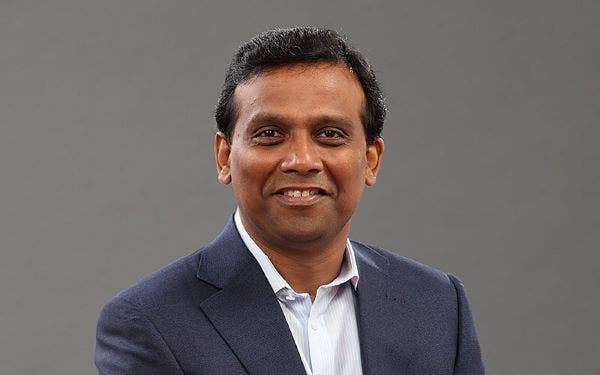Cognizant CEO: ‘Generative AI Will Revolutionize The Technology Services Industry’
‘We are using AI to enhance our own creativity and productivity. We are operating pilots that use generative AI to accelerate consulting, design, engineering and operations with the long-term goal of doubling the productivity of our associates,’ says new Cognizant CEO Ravi Kumar.

Even as macroeconomic headwinds impact customer spending in 2023, global IT solution provider Cognizant is moving forward with new generative AI and cloud projects the company expects to lead to growth going forward.
Ravi Kumar, who joined Cognizant as CEO in January after 20 years at rival India-based global IT services and consulting firm Infosys, Wednesday told financial analysts at the Teaneck, N.J.-based company’s fiscal first-quarter 2023 financial conference call that his company is moving to get ahead of the generative AI trend and its impact on clients’ businesses and Cognizant’s own productivity.
To that end, Kumar said in his prepared remarks that Cognizant is accelerating its investment in generative AI and collaborating with clients to identify priority AI use cases and rapidly implement prototype solutions for field testing.
[Related: Infosys President Becomes New Cognizant CEO With Plans To ‘Unlock’ Potential]
“We believe generative AI will revolutionize the technology services industry, creating higher rates of productivity and driving greater prominence for software and data engineering expertise,” he said. “We are using AI to enhance our own creativity and productivity. We are operating pilots that use generative AI to accelerate consulting, design, engineering and operations with the long-term goal of doubling the productivity of our associates.”
With that in mind, Cognizant, which is ranked No. 7 on CRN’s 2022 Solution Provider 500, last month launched a next-generation platform that brings new levels of automation and intelligence to applications and infrastructure operations, Kumar said.
“By applying an AI-led automation-first approach, we are enabling enterprises to innovate faster and drive out cost and risk,” he said. “We believe that enacting new IT operations can actually reduce operational costs by 25 [percent] to 45 percent, reduce mean time to delivery and mean time to detect by 30 [percent] to 50 percent, and reduce FTEs [full-time equivalent employees] by 15 [percent] to 30 percent compared with the use of traditional approaches.”
Kumar also said that the cloud has become the biggest transformational opportunity across every industry, and so clients need a partner that unlocks orchestrated cloud networks in their environments. In response, the company recently introduced a new cloud platform called Cognizant Skygrade, he said.
“This multi-hybrid-cloud and edge management platform has an industry-focused approach designed to help clients transition to a modern cloud-native architecture and develop modern applications that evolve with the pace of business and streamline their cloud management operations,” he said. “With Skygrade, we believe we can accelerate migration and modernization programs by shortening transmission time by 20 [percent] to 40 percent, resulting in faster value realization while reducing ongoing run and governance costs by 15 [percent] to 25 percent.”
Kumar used his prepared remarks to also introduce Cognizant’s NextGen program, which is an internal program aimed at simplifying the company’s operations and consolidating and realigning office space to better reflect the post-pandemic hybrid work environment.
“The shift will provide an opportunity to rationalize the work spaces across the world, and especially in India’s largest cities where we’re redistributing some real estate to smaller cities where we can expand, and by modernizing some existing space,” he said. “We expect the structural shift to help eliminate 80,000 seats and 11 million square feet in large cities in India. The shift will also enable us to invest in collaboration spaces in smaller cities, while creating structural savings for the future that we can invest in our people and growth opportunities.”
Cognizant CFO Jan Siegmund, in his prepared remarks, said the NextGen program will result in layoffs of about 3,500 employees, or about 1 percent of the company’s global workforce.
Cognizant continues to see macroeconomic headwinds impacting its customer base, Kumar said.
“We believe our company’s specific operational challenges in financial firms have largely subsided and we’re beginning to stabilize the business,” he said. “Our client portfolio has shown resilience both in U.S. and internationally. But we’re also seeing the impact from softer discretionary spending decision delays by existing and potential clients.”
In the U.S., Cognizant has seen an uptick in its deal pipeline with its banking clients, which are generally large institutions, Kumar said.
“Overall, we have seen early green shoots that we’re moving this portfolio in the right direction when navigating the macro dynamics,” he said.
Kumar said that since becoming Cognizant CEO, he has met with executives from about 100 clients, including about two dozen financial services clients.
“I came away from these meetings with many new opportunities to pursue related to cost takeout when the consolidation, post-merger integration and the new wave of outsourcing and fintechs,” he said.
That said, Cognizant still has a lot of work ahead and will be closely monitoring the environment to anticipate shifts in clients needs, Kumar said.
Clients he talked with said they like Cognizant’s entrepreneurial approach to developing solutions to their challenges, as well as the company’s willingness to learn, listen and adapt, Kumar said.
Cognizant is carefully monitoring an uncertain macroeconomic environment and its potential for shifts in client priorities, Kumar said.
“That said, we’re optimistic about our long-term opportunity within the IT services market,” he said. “The demand for solutions and business outcomes remain solid as technology becomes core for nearly every business.”